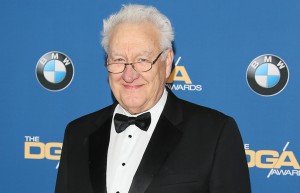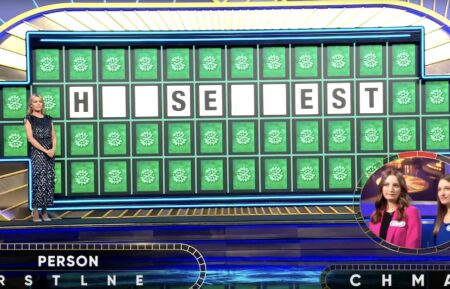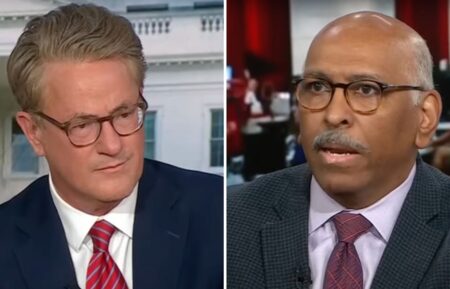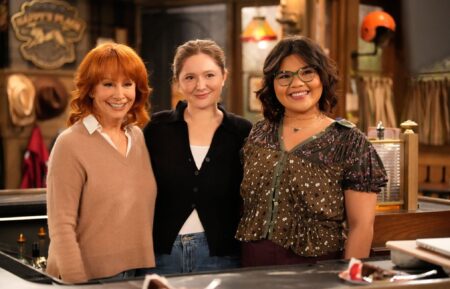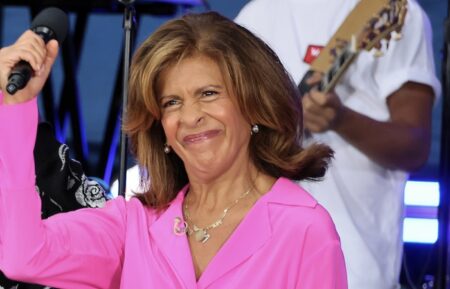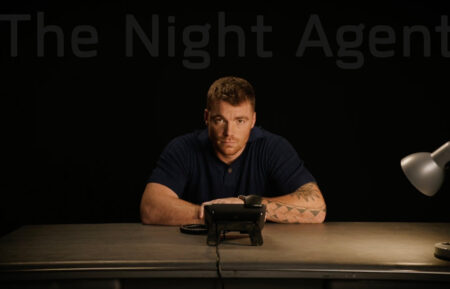Emmys Producer on His Tracy Morgan Surprise, HBO’s Dominance, Spoilers and Why The Ratings Were Down
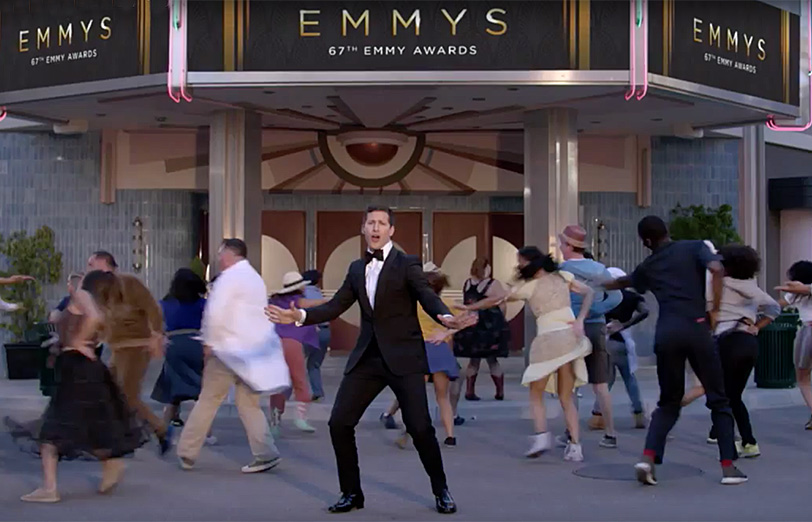
The ratings were low but the reviews were good for Sunday night’s 67th Emmy Awards. Producer Don Mischer admits it’s getting harder to put together the telecast: TV fragmentation means fewer viewers are familiar with Emmy nominees, and the NFL has become formidable Sunday night competition for the show.
We caught up with Mischer–who has produced countless Oscars, Super Bowl halftime shows and Tony Awards, among others–to give us the backstory on this year’s show. Mischer says he was proud of elements such as Tracy Morgan’s surprise appearance and Andy Samberg’s hosting duties–plus, best of all, he ended the telecast on time. He also addresses that clip package full of series finale spoilers that angered several fans on social media.
How did you put together Tracy Morgan’s surprise appearance as a presenter at the end of the show?
Mischer: We called Lewis Kay, who is Tracy’s publicist, back in June and asked him if there was any chance that Tracy would be able to come and perhaps present the last award. At that time, the feeling was that it was not going to be possible. He had still not recovered yet. Then in about the middle of August, Lewis said to me that Tracy really appreciated that we asked, and that we wanted to celebrate his first time back on stage. So we worked out a plan to make it a big surprise, which we thought would be more effective.
We talked to Tracy and he agreed that he would not come and sit in the audience. He agreed that he would not do the red carpet. He understood that we really wanted to make it a surprise. We were on the air at 5 p.m. (PT), and Tracy came at about 7:15 or 7:20, knowing he was going to go on at about 7:50. We did not bring him up to the producers’ table backstage because there are all these people back there Tweeting. So we rehearsed on a computer in his room. We gave him very few remarks. Tracy really wanted to be there, and really wanted to have a moment to thank people.
When did you shoot Andy’s “I’ve Watched Every Show” opening number, and how did you get stars like Kerry Washington and Jon Hamm involved?
Mischer: That was Andy’s idea. He came up with it. He had a wonderful team of writers [led by Comedy! Bang! Bang! star/producer Scott Aukerman] who shot that out in [Santa Clarita, Calif.], the Saturday and Sunday of the weekend before the Emmy awards. We were able to get the people who made cameos, like Jon Hamm, up there. They came out to do their pieces. We spent a lot of time on it. I think it set the tone for the show. There is so much television to watch now, it’s really hard to keep up with everything. I don’t know how those of you who write about television do it.
You had some unexpected winners and several first-timers on the Emmy stage.
Mischer: Fortunately. As a producer, you always hope for that. You hope for surprises. It was gratifying when it was over to know that the show really reflected in many ways the kind of new landscape for television.
How did Andy do?
Mischer: Andy did a terrific job. He was very honest and he’s very tuned in to what’s going on in television. When I say “honest,” just look to the jokes in his monologue. “Racism is dead. Don’t fact-check that.” That kind of humor. I’ve been told that we had a leap in younger people watching the show. Andy’s material helped people appreciate and understand the significance of the diversity that was represented in the nominations and the winners. But the great thing about Andy is he did make fun about things that happened in television over the past season, but underneath it all there’s a great respect for television. When he walked out on that stage, I can’t overemphasize how important this is. When you heard him speak, you had the feeling he wanted to be there and was completely comfortable being there. Sometimes hosts don’t reflect that kind of attitude. When they do, people really respond.
Where did idea for parodying the Coca-Cola commercial at the end of Mad Men come from?
Mischer: I was so afraid of showing that to everybody. We live in a very politically correct time right now. You have to be real careful about making fun of things. We shot that on the same weekend we shot the opening clip. Andy and his team of writers came up with this. We had said to him in the beginning, the more comedy that you can do that are based on moments that were talked about or moments that had impact during the television season, the better. While Andy did do a joke about Bernie Sanders and Donald Trump, 98% of what he did was about television, which we were there to celebrate that night.
There were a few Donald Trump jokes on stage, but it didn’t overwhelm the proceedings. How did you manage to steer clear of being political?
Mischer: I think a joke or two like that is fine, but you should be careful about going down the political path too far. Once you get on the air, these shows move in a direction on their own and people pick up on some things. I remember many years ago when Dan Quayle was vice president and had made a comment about Candace Bergen’s character being pregnant but not married on Murphy Brown. Everybody who came up to the microphone at the awards show that night made a mention of it. You always hope that doesn’t happen.
You ran a clip package about season finales, and gave away some endings. Did you expect to incur the wrath of viewers who felt they had been spoiled?
Mischer: I know, we got a lot of Tweets about this. Normally you have four or five shows that say goodbye in a season. This year there was like 50 or 60 major shows like Letterman and Colbert and Jon Stewart and Mad Men and Parks and Recreation. They had been on the air months back. We thought it would be good to go back and remember some of those shows. The spoiler alert thing, I thought we might get a little reaction. But we felt like it was still something that worked. Television, unlike the Oscars or the Grammys, shows can be on for decades. People have relationships with these shows. When they do say goodbye like Cheers or M*A*S*H, it’s significant. We wanted to remind people of that. But I’m sorry for those people that we spoiled.
HBO had a big night, so it was a nice coincidence that Andy had some fun by supposedly giving out his HBO GO account information.
Mischer: That was Andy’s idea, and he ran that by [HBO heads] Mike Lombardo and Richard Plepler. I asked him, “Are you sure we can do this?” And he told me that he talked to them and that it would be OK.
HBO appeared to be in on the joke and had an account ready.
Mischer: Yes they did. And what a great night for HBO.
Was there anything we didn’t see? Did you have to shelve anything for time?
Mischer: We have, in the nomination packages, several different versions ready to go. In the film clips, let’s say lead actor in a drama series, we’ll have a live read, which takes 25 to 30 seconds; a medium-length package, which includes some of their work, about a minute in length; and then we’ll have a long package, up to a minute 50 seconds, in which you can really showcase dramatic scenes. There was one point during the night where we were running nine minutes long, and I was really getting concerned. But you start to trim things. Out of a commercial you might take 12 seconds to get back into the room and let things settle, but you cut those out. You will cut out bumpers about what’s coming next. And I’m always making these decisions about the packages. We did not see some nomination packages that I wish we could have seen. But it’s the only way it works. It’s three hours of show, 26 awards–which is more awards than any other show–and you have to get out on the second. It’s tough to time these shows. In the last act we knew Mel Brooks and Tracy Morgan were going to get standing ovations.
How did you do?
Mischer: We were two seconds long in terms of getting off the air on time. Which was a victory for us.
The telecast averaged 11.9 million viewers, making it the lowest-rated Emmys ever. Were you disappointed by the ratings?
Mischer: When you’re up against the NFL, the NFL just kills you. Especially if it’s a good game, and this was a good game. If the game that Fox had on before us, the Cowboys vs. the Eagles, had gone into overtime, and had we gone on the air just a minute or two after that game was over, we would have started with a much higher rating. But football fans switched to the NBC game. You really can’t beat that. It’s a juggernaut.
You were also up against Fear the Walking Dead on AMC.
Mischer: That’s true, and that’s what’s happening in television. There’s more and more content on more platforms. People are less familiar with all of the nominees. That also can help reduce your ratings. If you don’t have HBO or watch Amazon or Netflix, you’re not going to be invested in those shows. That’s something the Television Academy and all of us who love television are going to have to discuss. If there’s any way to stay away from competing against an NFL game, that would be my mantra.
The broadcast networks don’t love how the Emmy telecast has turned into a promotion for things not on their air, and I doubt they’re happy with this year’s HBO sweep.
Mischer: That’s what’s happening. That’s what the television landscape is today. It used to be a world where the four main networks who were on the Emmy wheel–ABC, NBC, Fox, CBS–they had the majority of the stars. Now it’s the opposite. When you’re producing a show, you need to take care of those four networks that pay for the Emmys. You’ve got to include the people who support and spend money on the Emmys. But you also have to include representatives for the other shows, many of which now get most of the nominations. It’s a hard job. But on Sunday night, we were lucky to have emotional acceptance speeches, we had a great host and we really had fun.

